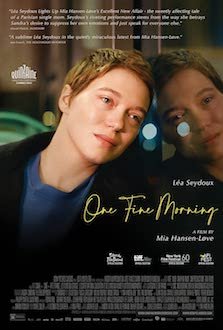Direction: Mia Hansen-Løve
Country: France
In Mia Hansen-Løve’s romantic drama One Fine Morning, Léa Seydoux (Blue is the Warmest Colour, 2013; France, 2021) is Sandra Kienzler, a widowed, avid-for-love interpreter who finds herself at a serious emotional crossroads. She tries to cope with the anguish that stems from her father’s health deterioration and the joyful possibility of a new love. The film pulsates with desperate, even miserable passion as Sandra gets closer to Clément (Melvil Poupaud of Eric Rohmer’s A Summer’s Tale and Raul Ruiz’s Time Regained), a married old friend and cosmochemist who usually spends months away in Antarctica and the North Pole. They have one children each and their relationship is not without indecision and consecutive ups and downs.
Ingrained with melancholy and shot in 35 mm, the film doesn’t exactly take your breath away, but it’s not afraid to state that life can be often messy and unfulfilling. It’s a simple yet powerfully acted drama that flourishes because of the protagonists’ charisma. These two lonely souls manage to go beyond their existential ennui.
Hansen-Løve, who was partly inspired by her father’s illness and wrote the script when he was still alive, takes a more transparent approach in opposition to the more ambiguous tonalities of her last film, Bergman Island. One Fine Morning has a few floundering moments, especially those when illness is involved. And yet, with sorrowful tears in her eyes, Sandra keeps us connected with her irrepressible hope.







